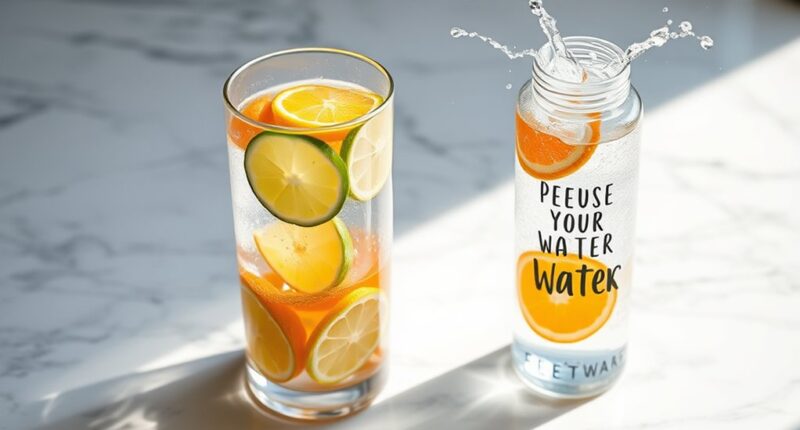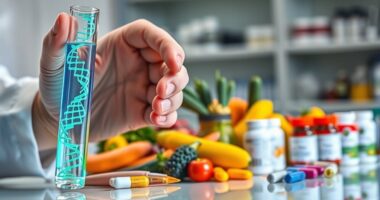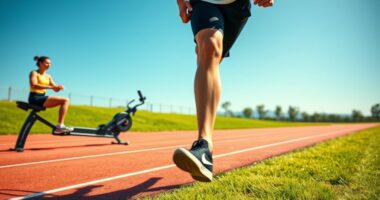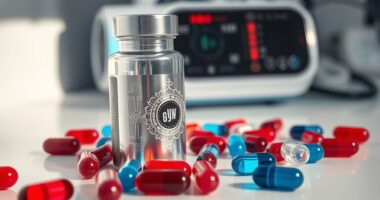The “eight glasses a day” rule oversimplifies hydration, ignoring your individual needs and the importance of electrolytes. Your body signals when you need fluids through thirst and urine color, so listen to these cues instead of sticking to a fixed number. Drinking only water may not restore lost minerals, especially during exercise or hot weather. To truly stay hydrated, focus on balancing fluids and electrolytes — and you’ll find out more just below.
Key Takeaways
- Hydration needs vary; drinking eight glasses daily isn’t a one-size-fits-all rule.
- Thirst and urine color are better indicators of hydration than a fixed water intake.
- Electrolyte balance is crucial; solely drinking water may not restore necessary minerals.
- Overhydration can lead to hyponatremia, a dangerous condition caused by excess water.
- Focus on personalized hydration strategies using diet, electrolytes, and listening to your body’s signals.
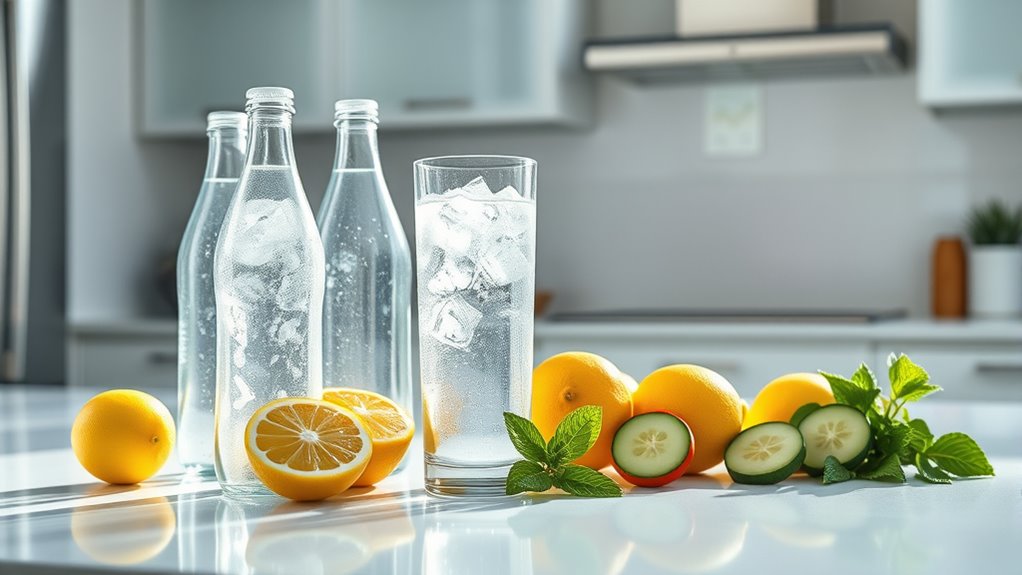
Ever wonder how to stay ideally hydrated throughout the day? It’s a common question, and the answer isn’t as straightforward as just drinking a set number of glasses. Many people believe that sticking to the classic “eight glasses a day” rule is enough, but hydration isn’t simply about quantity. Your body needs a balanced intake of fluids and electrolytes to maintain proper functioning. Electrolyte balance is essential because it helps regulate nerve and muscle function, keep your blood pressure steady, and ensure your cells operate efficiently. When you don’t get enough fluids or lose too many through sweating, urination, or illness, dehydration symptoms can quickly set in, including headaches, fatigue, dizziness, and dry mouth. Recognizing these signs is key to preventing serious health issues.
If you’re focusing solely on water intake without considering electrolytes, you might not be fully supporting your hydration needs. For example, during intense exercise or hot weather, your body loses vital minerals like sodium, potassium, and magnesium through sweat. Replenishing only water won’t restore electrolyte balance, which can prolong dehydration symptoms and impair your performance or recovery. That’s why sports drinks or electrolyte-enhanced waters can be beneficial in these situations—they help restore the minerals lost and promote effective hydration. But for everyday hydration, plain water usually suffices if you’re eating a balanced diet rich in fruits, vegetables, and whole foods, which naturally contain electrolytes.
Another common misconception is that you need to drink large amounts of water constantly to stay hydrated. In reality, your body is quite good at signaling when it needs more fluids. Thirst is your best guide—if you’re feeling thirsty, it’s a clear sign to hydrate. Conversely, if your urine is light-colored and clear, you’re likely well-hydrated. If it’s dark, you probably need to drink more. Overhydration, or drinking excessive amounts of water, can also be dangerous, diluting electrolytes and causing a condition called hyponatremia, which can be life-threatening. So, balance is key. Additionally, understanding your individual hydration needs can help you optimize fluid intake and avoid common pitfalls.
Frequently Asked Questions
Does Drinking Water Improve Skin Elasticity Instantly?
Drinking water can improve your skin hydration quickly, but it doesn’t instantly boost skin elasticity. When you hydrate properly, your skin absorbs water rapidly, helping to plump up your skin and temporarily improve its elasticity. However, long-term improvements depend on consistent hydration and overall skin care. So, while drinking water benefits your skin’s moisture levels fast, lasting elasticity requires ongoing hydration and healthy habits.
Can Certain Foods Replace Drinking Water Entirely?
You might wonder if certain foods can replace drinking water entirely. While some foods provide good food hydration, they can’t fully substitute water as your primary water source. Fruits like watermelon and oranges, and vegetables like cucumbers, do help with hydration, but they aren’t complete water substitutes. To stay properly hydrated, you still need to drink plenty of water, especially during hot days or after exercise.
How Does Hydration Affect Athletic Performance?
Hydration plays a vital role in athletic performance by maintaining electrolyte balance and optimizing hydration timing. When you’re well-hydrated, your muscles function better, reducing fatigue and cramping. Proper hydration guarantees quick recovery and sustained energy. If you neglect it, performance drops, and injury risk increases. Drink water consistently before, during, and after activity to stay ahead of dehydration, keeping your electrolytes balanced and your performance at its peak.
Are There Signs of Overhydration to Watch For?
You should watch for signs of overhydration, like nausea, headache, and confusion. Overhydration can cause electrolyte imbalance, leading to muscle weakness or cramps, and may put strain on your kidneys. If you notice these symptoms, it’s essential to reduce fluid intake and seek medical advice. Staying balanced with proper electrolyte levels helps prevent these issues and keeps your kidneys functioning smoothly during intense activity or hot weather.
Is Flavored or Infused Water Healthier Than Plain Water?
Did you know that flavored or infused water can increase your intake by 80%? When comparing infused vs plain, flavor benefits include making hydration more appealing, encouraging you to drink more. Infused water offers subtle tastes without extra sugar, making it a healthier choice. While plain water is best for hydration, flavored options can help break monotony, especially if you struggle to drink enough. Just watch for added sugars in commercial versions.
Conclusion
Remember, hydration isn’t a one-size-fits-all rule. Think of your body like a garden—you don’t water it the same way every day. I once ignored my thirst, thinking I needed exactly eight glasses, only to feel sluggish. Turns out, listening to your body and drinking when you’re thirsty keeps you balanced. So, ditch the myth, stay flexible, and trust your instincts—your body knows best when it’s time to hydrate.

